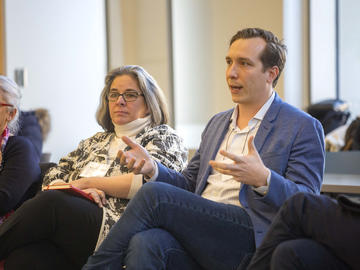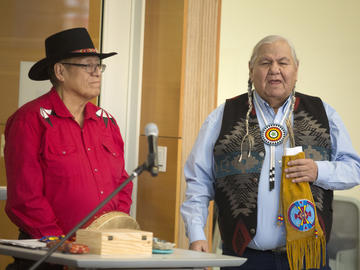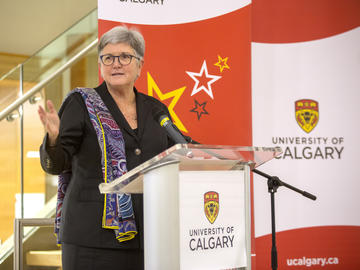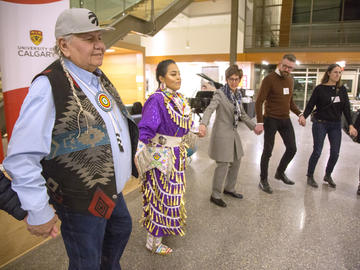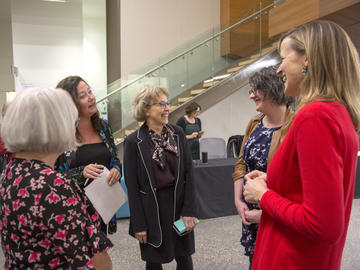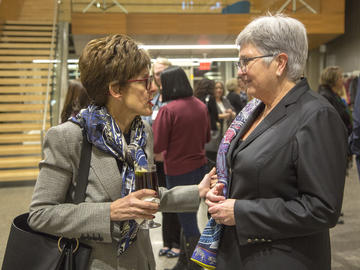Jan. 28, 2020
Delegates rethink community engagement through an Indigenous lens

Last week, 60 delegates from institutions and organizations across the country, and representatives from the Carnegie Foundation in the U.S., came together for the mid-cycle convening of the Carnegie Community Engagement Classification – Canadian Pilot Cohort at the Taylor Institute for Teaching and Learning.
The Carnegie Foundation’s Classification for Community Engagement has been the leading framework for institutional assessment and recognition of community engagement in U.S. higher education for the past 13 years, and now, 16 Canadian institutions are working together to rethink what community engagement means in our country.
“Canada has its own set of unique social and cultural elements that must be deeply explored in order to make this project a success, and I am confident that this talented group will emerge with something we can all be proud of,” says Dru Marshall, provost and vice-president academic.
Starting in early 2019, the cohort identified reconciliation and Indigenous engagement as a key priority for the Canadian framework and named reciprocity, reconciliation, courage, accountability and collaboration as guiding values of the pilot. The convening strongly reinforced this commitment.
Dr. Reg Crowshoe, UCalgary’s Elder in Residence, was deeply involved in the two-day convening, and spoke at length about the importance of merging oral and written systems and ways of knowing to form parallel paths to learning and growth. Two sharing circles brought the team together to talk about their strategies and goals in an inclusive, respectful way, and each participant received a small bundle that will guide them on their individual journeys to advance the pilot project in their own institutions.
The convening also included a knowledge transfer ceremony facilitated by Reg Crowshoe and Stoney Nakoda Elder Rod Hunter, transferring the knowledge gained in Calgary back to Simon Fraser University, the lead of the pilot in Canada.
“It was a privilege to work with Reg Crowshoe and Rod Hunter who helped created a parallel model to guide the learning of our national cohort,” says Leslie Reid, vice-provost, teaching and learning, and member of the UCalgary Steering Committee responsible for the pilot. “We are grateful to all participants – those who joined us in person or online – for engaging so fully in our meetings, our sharing and learning circles and the cultural ceremonies. Together, we created a shared and ethical space for dialogue and growth.”
Susan Skone, associate vice-president, research joined the convening to present on the Urban Alliance, highlighting UCalgary’s strategic partnership with the City of Calgary for the benefit of all our communities. Participants also enjoyed an online presentation with the project lead of the Australian Pilot Cohort, who shared the progress of the Carnegie pilot underway in Australia. The two-day convening closed with in interactive session on the continued development of McMaster University’s community engagement programs.
At the convening’s reception, Chancellor Deborah Yedlin shared UCalgary’s enthusiastic support for the pilot program: “We are on an ambitious journey to create new knowledge, find new answers and help thousands of students define their future and change the world, all while engaging the communities we serve and lead. I look forward to learning more about the results of the Canadian Carnegie Community Engagement framework in the coming years.”
Simon Fraser University's Matthew Grant, director, community engagement and outreach (external relations), and project lead of the Canadian Pilot Cohort, expressed how important the pilot is for transformational change. “Together with our partners from Brown University, the research and administrative home of the Elective Carnegie Community Engagement Classification, the McConnell Foundation, the 16 Canadian participating post-secondary institutions, and the Carnegie Foundation for the Advancement of Teaching itself, we are furthering our commitment to equity, diversity and inclusion as we contemplate collaborative practices in teaching, research and creative activity to bring transformational change towards reciprocity and reconciliation.”
The Canadian Pilot Cohort aims to develop and launch a Canadian framework in 2021, which will set into motion the opportunity for post-secondary institutions and community partners to work collaboratively to create and sustain positive impact, and grow mutually beneficial partnerships in the years to come.
Visit the Carnegie Community Engagement Classification website for more information and updates about the pilot project.


